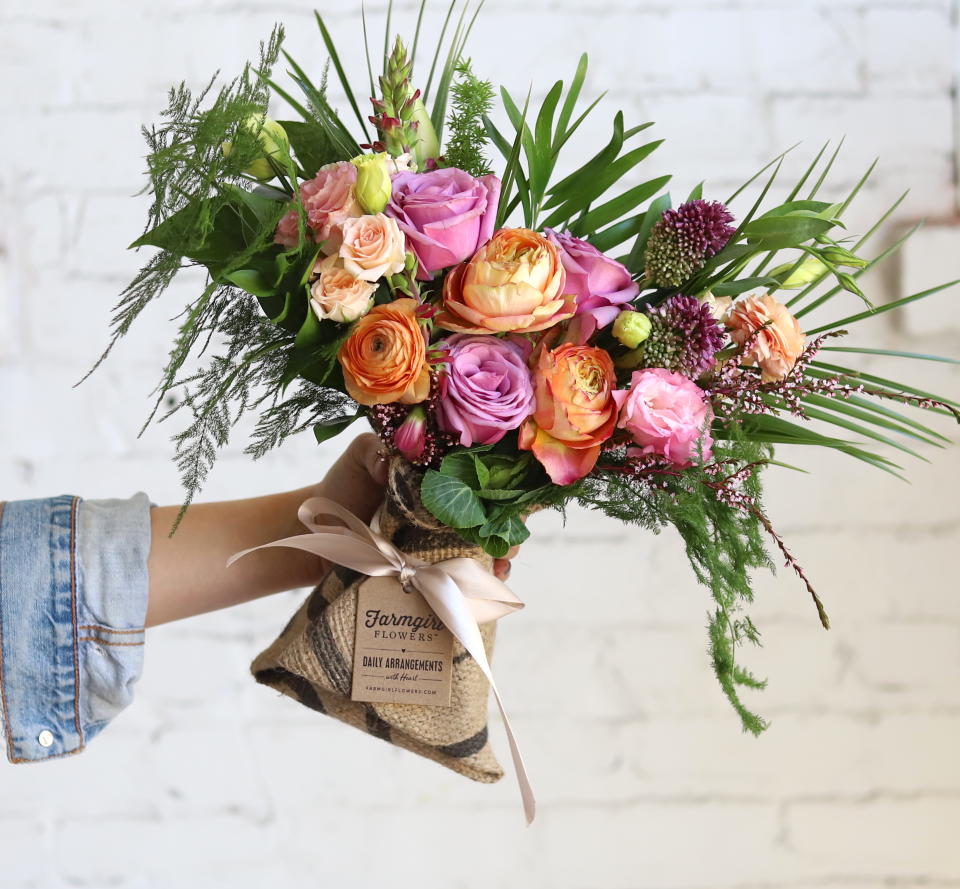How legal weed disrupted this flower startup's supply chain
Christina Stembel clearly remembers the day after California legalized recreational marijuana.
That day in November 2016 was a tipping point for one of the biggest pivots her then-six-year-old startup, Farmgirl Flowers, had made to date.
“The day after the vote went through and it was a ‘yes’ in California, our largest calla lily grower in California took out all of their calla lilies to put in cannabis instead ... to get the soil ready for it,” Stembel said during an interview for Yahoo Finance’s Breakouts series.
“It was pretty immediate,” she said. “And we had to change our entire supply chain in four months, otherwise we wouldn’t have had enough flowers for Valentine’s Day after the vote.”
Stembel, 42, is founder and CEO of Farmgirl Flowers, a San Francisco-based e-commerce flower bouquet delivery company that brought in $30 million in sales last year. Selling an assortment of burlap-wrapped anemones, poppies and calla lilies, Stembel and her team of more than 160 employees have aimed to disrupt a multi-billion floriculture industry rooted in more old-fashioned, cellophane-wrapped arrangements of blood-red roses and baby’s breath.
But Stembel’s business itself was disrupted by recreational cannabis legalization in her company’s home state. After the legalization vote, many of the local suppliers she’d once leaned on to provide the flowers that made up her bouquets were suddenly turning to a new crop.
“There’re only so many farms out there in the United States now,” Stembel. “And if they can make $2 a square foot or $1.50 a square foot on cannabis, versus $0.05 or $0.10 on snap dragons, it's a very easy choice for them.”
“I don't blame them for that,” she added. “They're business people as well. But there's definitely a lot of the flower farmers [that] have switched to growing a lot more cannabis and less flowers for that reason alone.”

‘We just ran out of supply’
The U.S. cannabis industry is poised to become a near $30 billion industry by 2025, according to New Frontier Data. That would begin to close in on the U.S. floriculture industry, which saw just under $35 billion in sales in 2019, according to Bureau of Economic Analysis data. And unlike the cannabis industry, which is expected to see sales rise at a compounded annual growth rate of 14% through 2025, floriculture sales have stagnated in the low-$30 billion range for years.
Farmgirl Flowers has been far from the only player in the cut flower industry to take a hit from burgeoning legal recreational cannabis market. A number of reports have highlighted former Californian flower growers who switched to cannabis, as rising competition from cheaper flowers coming from Latin America drove down prices they could command from their existing flower crops.
And incidentally, Latin America was ultimately where Stembel turned when her former suppliers in the U.S. had shriveled on the vine. After nearly seven years of sourcing from local farmers, Stembel wrote an open letter to her customers explaining her decision, and began buying from farmers in South America. The decision was driven both by the disruption from cannabis legalization, and by a broader inability to find enough U.S.-based farms willing to sell to her start-up to keep pace with customer orders.
“We just ran out of supply,” Stembel said. “There was not a supply for our demand, and so I needed to do something different. Or I needed to either stop doing business or stay a very small business and not scale.”
To date, the shift in sourcing has so far worked for Farmgirl Flowers, with the company consistently delivering between 6,000 and 8,000 bouquets per week across 48 states. For the week of Valentine’s Day 2019, Stembel anticipates that number will jump more than 50% over last year to 30,000.
Eventually, Stembel said the pendulum may swing back in the other direction and that farmers may begin shifting back to growing flowers, once the cannabis industry matures and the cultivation market becomes saturated.
“If everybody is growing cannabis, there’s going to be a point, which we probably have already met, where we just have oversupply,” she said. “Maybe it’ll shift back a little bit, but in the meantime, we’re going to have to find other options.”
—
Emily McCormick is a reporter for Yahoo Finance. Follow her on Twitter: @emily_mcck
Read more from Emily:
Farmgirl Flowers became a multimillion dollar e-commerce startup without a penny in VC
OKCupid is changing how people use dating apps amid an international expansion
‘Most of the job growth is happening with people over age 55’: Economist
Netflix 4Q subscriber growth tops expectations, but guidance disappoints
Tesla 4Q earnings top expectations, company sees 500K+ deliveries in 2020
Follow Yahoo Finance on Twitter, Facebook, Instagram, Flipboard, LinkedIn, and reddit.
Find live stock market quotes and the latest business and finance news